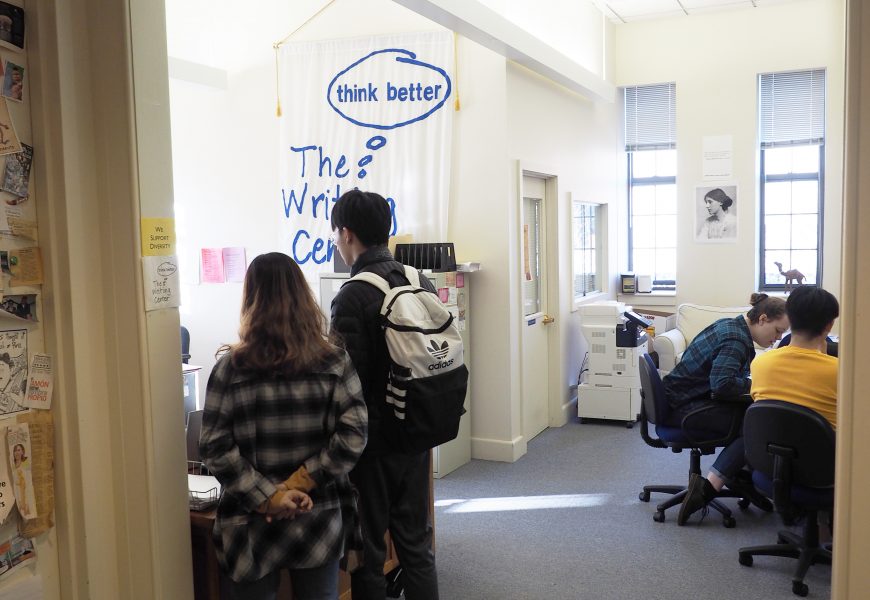The Writing Center in Blaustein. Photo courtesy of Sophia Angele-Kuehn.
The Academic Resource Center (ARC), an institution which provides academic support services for students, was established with the intent to inspire collaboration with faculty and students to develop the professional skills of students as well as their academic success. The model has sustained its deep connection between students and faculty since it first opened in January 2013, with its first official space located in Main Street West. In 2015, the ARC moved to the newly renovated Charles E. Shain Library where it quickly became an asset that leads nationally in academic development and transferable skills. Recently receiving a gift of $10 million from anonymous donors, the need to expand the ARC was clear. The contribution is the result of a $5 million anonymous donation, and a $5 million challenge grant in which every million dollars that the college raises for the ARC the donor will match.
The gift will not only be used to expand the space in the library, but also to support three programs: the Program for Communication Excellence, the Program in Critical and Collaborative Thinking, and the Program in Quantitative Reasoning.
Noel Garrett, the Dean of Academic Support and Director of the ARC, oversees the ARC and Writing Center. As a champion of student academic success, Garrett explained how important the donation is to Conn and the future of student success at the College. Garrett stated that the Program for Communication Excellence will focus on courses where students present their work in an effort to advance career transferable skills. He explained that they’ve already “started doing that a lot in first-year seminars.” With the All-College Symposium coming up in the beginning of November, the ARC is working closely with Pathways, Centers, and upper-class seminars.
The Program in Quantitative Reasoning will “blow into STEM disciplines,” Garrett hopes. With a growing interest in STEM programs, it appears there will be more opportunity for courses which are targeted for students learning physics, chemistry, or biology. There is also a clear need for more advanced learning in Excel. Garrett suggested that “instead of 30 different independent studies, let’s do a class.”
Programs like Fast Forward, a week-long career intensive put on by the ARC and alumni experts that has been successful in the last five years, exemplifies how the ARC is already “working with students to apply this information to real-world situations,” Garrett said.
The Program for Critical and Collaborative Thinking will follow suit. Garrett used an example of “using calculus to think about what’s going on politically.” There will be a greater focus on business and finance, which has a growing interest amongst students and is crucial to professional development. There will also be space for pre-med students interested in business to find a space in which their studies can flourish, and even a space where critical thinking and interest in non-profits can take place, as Garrett claimed “this space is missing.”
Garrett is excited to see the execution of new exam space that will result from renovations that will take place in the ARC as it expands on the second floor of the library. It will serve as primarily a space to take tests, and when not used for exams, as spaces for group tutoring or work with the Writing Center. He explained that the ARC is “best expanded with peers.” Thanks to the donation, the Writing Center will be combined with the ARC. While the Writing Center is completely independent of the ARC and will remain an autonomous body on campus, part of the academic support paradigm at the college allows an excellent combination of resources between the ARC and the Writing Center. There has been speculation about the reduction of students jobs as a result of a changing and growing space that would no longer need the receptionists that the Writing Center attains. However, the Writing Center and ARC are dependent on the students that support them. “They will still have the same student numbers,” Garrett stated.
Ultimately, Noel Garrett concluded that it’s “been a lot of fun” to transform the professional communication and presentation of students, but also incorporate their growing interests since the ARC has opened. With such a gift, there is not only a new space to look forward to, but a large variety of programs that will not only integrate Conn students’ creativity into their academics, but will also have a transformative impact on the professions they pursue after their undergraduate experiences. •










